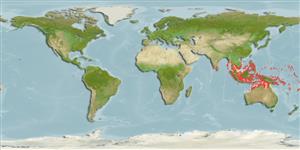>
Clupeiformes (Herrings) >
Dorosomatidae (Gizzard shads and sardinellas)
Etymology: Amblygaster: Greek, amblys = darkness + Greek, gaster = stomach (Ref. 45335).
Eponymy: Dr Pieter Bleeker (1819–1878) was an ichthyologist and army surgeon commissioned (1841) by the Dutch East India Company. [...] (Ref. 128868), visit book page.
More on author: Bleeker.
Environment: milieu / climate zone / depth range / distribution range
Ekologi
marina revassocierade; djupintervall 0 - 50 m (Ref. 188). Tropical; 17°N - 19°S, 75°E - 179°W (Ref. 188)
Indo-West Pacific: southern coasts of India, perhaps Bay of Bengal, and Indonesia eastward to Fiji. Reported from New Caledonia (Ref. 9070) and Tonga (Ref. 53797).
Size / Vikt / Age
Maturity: Lm ? range ? - ? cm
Max length : 27.6 cm TL hane/ej könsbestämd; (Ref. 126292); common length : 15.0 cm SL hane/ej könsbestämd; (Ref. 188); publicerad maxvikt: 247.00 g (Ref. 126292)
Taggstrålar i ryggfenan (totalt) : 0; Mjukstrålar i ryggfenan (totalt) : 13 - 21; Taggstrålar i analfenan: 0; Mjukstrålar i analfenan: 12 - 23. Body moderately deep, belly rather rounded, scutes not prominent. Distinguished from A. sirm by the absence of spots along the flank (gold in life, black on preservation) and fewer lower gill rakers. Closely resembles A. leiogaster, which has more lower gill rakers. Round-bodied Sardinella species have i 8 pelvic fin rays and more than 100 lower gill rakers.
Forms schools in coastal waters. Feeds on copepods, Mysis and other elements in the zooplankton. Used as bait in the tuna fishery.
Life cycle and mating behavior
Könsmognad | Reproduktion | Lek | Ägg | Fecundity | Larver
Spawn in school (Ref. 205).
Whitehead, P.J.P., 1985. FAO Species Catalogue. Vol. 7. Clupeoid fishes of the world (suborder Clupeoidei). An annotated and illustrated catalogue of the herrings, sardines, pilchards, sprats, shads, anchovies and wolf-herrings. FAO Fish. Synop. 125(7/1):1-303. Rome: FAO. (Ref. 188)
IUCN Red List Status (Ref. 130435: Version 2024-1)
Threat to humans
Harmless
Human uses
Fiskeri: kommersiell; bete: usually
Verktyg
Special reports
Download XML
Internet-källor
Estimates based on models
Preferred temperature (Ref.
123201): 27.2 - 29.1, mean 28.5 °C (based on 988 cells).
Phylogenetic diversity index (Ref.
82804): PD
50 = 0.5625 [Uniqueness, from 0.5 = low to 2.0 = high].
Bayesian length-weight: a=0.00813 (0.00458 - 0.01442), b=3.07 (2.92 - 3.22), in cm total length, based on LWR estimates for this species & (Sub)family-body (Ref.
93245).
Trofisk nivå (Ref.
69278): 3.1 ±0.28 se; based on food items.
Resiliens (Ref.
120179): Hög, lägsta populationsfördubblingstid mindre än 15 månader (Assuming Fec > 10,000).
Fishing Vulnerability (Ref.
59153): Low vulnerability (18 of 100).
Nutrients (Ref.
124155): Calcium = 95.5 [30.8, 395.3] mg/100g; Iron = 1.53 [0.53, 3.60] mg/100g; Protein = 20.2 [17.5, 22.6] %; Omega3 = 0.259 [0.118, 0.565] g/100g; Selenium = 51.1 [16.6, 168.4] μg/100g; VitaminA = 79.2 [16.6, 367.3] μg/100g; Zinc = 1.42 [0.70, 2.70] mg/100g (wet weight);
